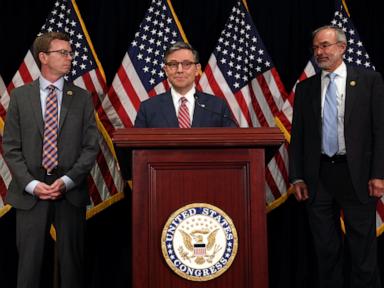House Republicans strike deal to make it harder to oust Speaker

Hard-line conservatives have struck a tentative deal with House Republicans concerned about chaos in the chamber, agreeing to raise the threshold to force a vote to oust the Speaker in exchange for concessions on rule changes — potentially putting Speaker Mike Johnson (R-La.) on a glide path to keep the gavel come January.
The deal — which multiple sources confirmed to The Hill — would significantly weaken the House “motion to vacate” rule, eliminating the threat of any one member triggering the kind of snap vote that resulted in the ouster of former Speaker Kevin McCarthy (R-Calif.). That historic ouster has loomed over Johnson’s tenure in the top job.
Under the agreement, hard-line conservatives would agree to raising the threshold to force a vote on ousting the Speaker from one member to nine members. The mechanism has been a key point of contention within the House GOP conference since McCarthy’s ouster. Hard-line conservatives were adamant about keeping it to one lawmaker before Wednesday.
In exchange for that concession, other members would drop the proposed rules changes — spearheaded by those in the Main Street Caucus — that aimed to punish members for rebelling against the majority of the party in ways that risked grinding legislative activity to a halt. Proposed penalties included removing members from committees if they support a motion to vacate against a Republican Speaker.
Rep. Chip Roy (R-Texas), who has been a vocal opponent of the rule changes, called them a “nonstarter.”
“All of the targeting amendments and stuff, those are all gone. And that was, as I tweeted out earlier, those were a nonstarter,” he said. “Those were a deal-killer.”
The deal was hatched shortly before Republicans voted on a nominee for Speaker, and after President-elect Trump threw his support behind the Louisiana Republican. Johnson, members of the conservative House Freedom Caucus and those in the self-described pragmatic Main Street Caucus were involved in the discussions. Johnson met members and allies of the Freedom Caucus minutes before Wednesday’s internal election, two sources told The Hill.
Conservatives who balked at the proposed changes — many of whom are members of the Freedom Caucus — had plotted to oppose Johnson’s nomination to the Speakership in Wednesday’s internal GOP elections as a form of protest. First they planned to nominate a last-minute protest candidate, then they planned to force a recorded vote on Johnson’s nomination to showcase opposition.
But after the agreement, Johnson was nominated to remain Speaker by unanimous voice vote. No member voiced opposition, according to multiple sources in the room.
That is good news to the Speaker, who will have another slim majority and will need near unanimity to be elected Speaker on the House floor when the new Congress convenes on Jan. 3.
Speaker Johnson appeared with Main Street Caucus Chair Dusty Johnson (R-S.D.) and Freedom Caucus Chair Andy Harris (R-Md.) to confirm the deal later on Wednesday.
Dusty Johnson said that Harris had reached out to him earlier in the day to strike the deal.
“That motion to vacate will be set at nine in return for getting rid of some amendments that probably would have divided this conference,” Dusty Johnson said. “Andy did a good job of explaining to Main Street leadership why those amendments would have divided the republican conference.”
Harris noted that Trump had visited the conference earlier in the day and asked for Republican unity.
“We've been able to work across the conference to eliminate the controversial issues that could have divided us and move forward together to deliver on the President's agenda,” Harris said.
Some lawmakers, however, are warning that the situation is tenuous. Roy, a leading voice on the Speakership talks, wrote on the social platform X that there is “much more work to be done” when discussing the agreement.
“For now - those offering the retaliation amendments agreed to set aside ALL of them while conversations continue about organization, so @SpeakerJohnson was chosen as Speaker,” he wrote.
Rep. Anna Paulina Luna (R-Fla.), meanwhile, told reporters “they are still going to be negotiating that as we get to January.”
Proponents of the “accountability amendments” in question were bitter about the chaos that plagued the House GOP over the last two years, not only from the weeks of standstill after McCarthy’s ouster, but from legislation that hard-liners blocked by tanking procedural votes.
They worried such actions could impede President-elect Trump’s agenda as he takes office, and pointed to the rebellions as a reason why Republicans did not win more House seats.
But the hard-line conservatives balked at the proposals, which were antithetical to their goals of further democratizing power. Such punishments for breaking from the party would prevent members from representing their constituents, they argued.
An internal memo circulated among conservatives before the deal was struck Wednesday said that the amendments would be “sowing seeds of division” when Republicans will have “no room for error in the next Congress,” and argued the rules would “punish those who fought for President Trump and his agenda for years and provide excuses for those who will likely obstruct it.”
One proposed amendment from Rep. Derrick Van Orden (R-Wis.) would have consequences for members who support a “motion to vacate” the Speaker, removing them from committees.
“We need to have cohesion and unity. We need to have parameters set,” Van Orden told The Hill in an interview on Wednesday morning, before the deal was struck.
Van Orden said that if unified Republican control of government does not change how the House GOP operates, “then Republicans don’t deserve the majority.”
“If we don't act boldly and decisively, then we have no business governing. And that is a flag that I'm planting in the ground. So we've got the House, we've got the Senate, got the White House, and if we don't act on the mandates that were given by the American people, we don't deserve it.”
Rep. Bill Huizenga (R-Mich.) proposed two rules changes, the first of which would remove members from committees if they voted against the “rule” — procedural votes that govern debate and consideration of legislation on the House floor that are considered tests of party loyalty.
His second proposal would have imposed similar consequences for those who vote for the party’s “Speaker Designate” on the House floor, a scenario that led to the House taking days to officially elect McCarthy as Speaker in January 2023, preventing the House from conducting any legislative activity.
Rep. Nick LaLota (R-N.Y.), too, had an amendment to remove members from committees if they defy the party on a procedural vote.
Johnson told Politico on Tuesday that he was not in favor of those rule changes, saying he was “not in favor of punitive measures and rules.”
But the hard-liners had wanted to see him explicitly advocate against the proposed rule changes.
“He can say he opposes them, but he's not going to try and stop them or whip against them,” Rep. Eli Crane (R-Ariz.) said.
Johnson, according to Crane, told House Republicans that he would not put his thumb on the scale and that it would be up to the House GOP to decide on the rules.
That fueled the risk of a formal show of opposition to Johnson. But the brokering of a deal, which caused a slight delay to the start of leadership elections as it was negotiated on Wednesday, ended with unanimous approval for the Speaker in a massive win for him.
-

House Republicans strike deal on motion to vacate, making it harder to oust speaker
Top stories - ABC News - 6 days ago -
House GOP reaches deal to make it harder to oust speaker
Top stories - CBS News - November 13 -

7 House seats Democrats think they can flip
Politics - The Hill - October 28 -

Speaker Mike Johnson fights to save the House Republican majority — and his job
Top stories - NBC News - October 25 -

Speaker Johnson, Scalise ask House Republicans for reelection to leadership
Politics - The Hill - November 7 -

Rep. Ciscomani: House Speaker must deliver and keep Republicans unified
Politics - The Hill - November 13 -

Republican John McGuire, who ousted Rep. Bob Good, wins Virginia House seat
Politics - The Hill - November 6 -

Republicans Make Early Inroads in Their Fight to Keep the House Majority
Top stories - The New York Times - November 6 -

Republican Rob Bresnahan ousts Matt Cartwright in Pennsylvania
Politics - The Hill - November 6
More from The Hill
-

Who will stand up to Trump’s unqualified nominees?
Politics - The Hill - 24 minutes ago -

Russia fired ICBM at Ukraine, Kyiv says
Politics - The Hill - 24 minutes ago -

Which major retailers will be closed for Thanksgiving this year?
Politics - The Hill - 29 minutes ago -

International Criminal Court issues arrest warrants for Netanyahu, Hamas leader
Politics - The Hill - 29 minutes ago -

US charges Gautam Adani, one of world's richest people, with fraud
Politics - The Hill - 46 minutes ago